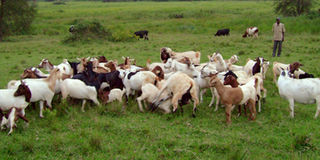Makerere to train all involved in extension service

Whether the farmers are involved in livestock, above, or crops, below, under a new arrangement, they will have better access to extension services.
What you need to know:
Extension services are vital for farmers but due to design or default, they have not been able to access the services. Under a new arrangement, this challenge could be overcome.
One of the things Makerere University is doing in agricultural extension service is knowledge transfer of the critical agricultural information, which can be passed on to the farmer. One such training has started with the Uganda Peoples Defense Forces (UPDF) slated to be part of the extension service.
Topics covered
Dr Denis Ampairwe, from College of Agricultural and Environmental Sciences, who coordinated training of the soldiers, explains that it is important to train different stakeholders. These would directly or indirectly get involved in agricultural extension.
In the model, the trainers consider topics surrounding crop production where participants are taught the main agronomy practices farmers are supposed to carry out for better yields. These include crop protection, seed management and fertiliser use. It is not restricted to crops but other areas like beekeeping, poultry, piggery, dairy and fish farming.
There is also the element of agribusiness dealing with farm enterprise and marketing of produce. In addition, the participants are taught which farm tools to use for which purpose, whether it is weeding, sowing, harvesting or pruning.
Monitor distribution
Other topics include climate change and its effects on agriculture, agricultural policy and the related laws including practical sessions where participants are taken to model fields and research institutes where some of these crop varieties, fish and animal species are developed.
Dr Ampairwe added that the reason why security personnel are brought on board is basically to monitor distribution of agricultural inputs in rural areas. They are supposed to ensure that farmers obtain what is meant for them. A case in point is if a sub-county is given goats to distribute to farmers in a particular location, they will make sure that these farmers are given the right quantity and quality goats.
If farmers in given village are supposed to be given hybrid rice varieties, they ensure that it is the right variety that is procured from the right source and given to the estimated number of farmers. Prof Dumba Sentamu, Vice Chancellor, Makerere University, points outs that it is important to embrace partnership in knowledge transfer especially in the agricultural sector to boost production.
Current design
“We have done it with police in fighting agriculture crime and since we have projects like the mobile fruit processor that was processing mango fruit in Yumbe district in West Nile, in Nakaseke we have a tomato fruit processor, all this machines need protection that can be provided by security personnel,” he said.
On his part, Aggrey Henry Bagire, chairperson Naads board of directors, is of the view that the Naads programme has been having challenges due to the previous design where farmers expected agricultural input from government.
Under the current design, the farmers are being encouraged to form associations and purchase the farm inputs themselves.
They will be sensitised about how to avoid buying fake farm inputs, carry out commercialised agriculture by marketing their produce through cooperative unions to avoid middlemen from exploiting them as well as better post-harvest handling practice in a bid to market quality farm outputs.




